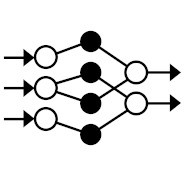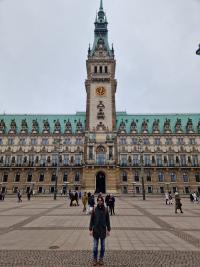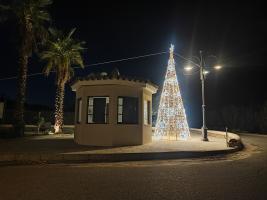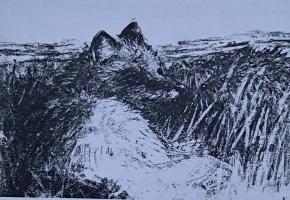Copy Link
Add to Bookmark
Report
Neuron Digest Volume 11 Number 35

Neuron Digest Wednesday, 2 Jun 1993 Volume 11 : Issue 35
Today's Topics:
CFP: "Computational Learning and Natural Learning" workshop
Symbolic Knowledge and Neural Learning: MLj Special Issue CFP
Brain Development Symposium in June
FIRST IEEE INTERNATIONAL CONFERENCE ON IMAGE PROCESSING
CforP: Workshop on NLP
AAAI Spring Symposium Series 1994 Call for Proposals
Workshp on ANN
2nd Neural Computation and Psychology Workshop: Language and Memory
CFP: music/creativity issue of Connection Science
Send submissions, questions, address maintenance, and requests for old
issues to "neuron-request@cattell.psych.upenn.edu". The ftp archives are
available from cattell.psych.upenn.edu (130.91.68.31). Back issues
requested by mail will eventually be sent, but may take a while.
----------------------------------------------------------------------
Subject: CFP: "Computational Learning and Natural Learning" workshop
From: Russell Greiner <greiner@learning.siemens.com>
Date: Thu, 29 Apr 93 14:26:26 -0500
CLNL'93 -- Call for Submissions
Computational Learning and Natural Learning
Provincetown, Massachusetts 10-12 September 1993
CLNL'93 is the fourth of an ongoing series of workshops designed to bring
together researchers from a diverse set of disciplines -- including
computational learning theory, AI/machine learning,
connectionist learning, statistics, and control theory --
to explore issues at the intersection of theoretical learning research and
natural learning systems.
Theme: To be useful, the learning methods used by our fields must be able
to handle the complications inherent in real-world tasks. We therefore
encourage researchers to submit papers that discuss extensions to learning
systems that let them address issues such as:
* handling many irrelevant features
* dealing with large amounts of noise
* inducing very complex concepts
* mining enormous sets of data
* learning over extended periods of time
* exploiting large amounts of background knowledge
We welcome theoretical analyses, comparative studies of existing algorithms,
psychological models of learning in complex domains, and reports on relevant
new techniques.
Submissions: Authors should submit three copies of an abstract (100 words
or less) and a summary (2000 words or less) of original research to:
CLNL'93 Workshop
Learning Systems Department
Siemens Corporate Research
755 College Road East
Princeton, NJ 08540-6632
by 30 June 1993. We will also accept plain-text, stand-alone LaTeX
or Postscript submissions sent by electronic mail to
clnl93@learning.scr.siemens.com
Each submission will be refereed by the workshop organizers and evaluated
based on its relevance to the theme, originality, clarity, and significance.
Copies of accepted abstracts will be distributed at the workshop, and
MIT Press has agreed to publish an edited volume that incorporates papers
from the meeting, subject to revisions and additional reviewing.
Invited Talks:
Tom Dietterich Oregon State University
Ron Rivest Massachusetts Institute of Technology
Leo Breiman University of California, Berkeley
Yann le Cun Bell Laboratories
Important Dates:
Deadline for submissions: 30 June 1993
Notification of acceptance: 20 July 1993
CLNL'93 Workshop: 10-12 September 1993
Organizing Committee:
Russell Greiner, Steve Hanson, Stephen Judd, Pat Langley,
Thomas Petsche, Ron Rivest, Tomaso Poggio
Registration Information is available from clnl93@learning.scr.siemens.com
or the above address.
------------------------------
Subject: Symbolic Knowledge and Neural Learning: MLj Special Issue CFP
From: Jude Shavlik <shavlik@cs.wisc.edu>
Date: Thu, 29 Apr 93 14:30:13 -0600
CALL FOR PAPERS
for a Special Issue of the Journal MACHINE LEARNING on
SYMBOLIC KNOWLEDGE AND NEURAL LEARNING
(edited by C. L. Giles and J. W. Shavlik)
This special issue will focus on novel and effective methods for acquiring and
refining symbolic knowledge with neural learning. Particular topics of
interest include insertion of prior knowledge into neural networks,
alterations to standard neural training that are appropriate for the
refinement of symbolic knowledge, and understanding trained neural networks.
Submission deadline: November 1, 1993
(See a recent issue of Machine Learning for information for authors.)
Send two (2) copies of submissions to:
Jude Shavlik
Computer Sciences Dept
University of Wisconsin
1210 W. Dayton Street
Madison, WI 53706 USA
(608) 262-7784
shavlik@cs.wisc.edu
Also mail four (4) copies of submitted papers to:
Karen Cullen
MACHINE LEARNING Editorial Office
Kluwer Academic Publishers
101 Philip Drive
Norwell, MA 02061 USA
(617) 871-6300
karen@world.std.com
Note: Machine Learning is now accepting submission of final copy in electronic
form. There is a latex style file and related files available via anonymous
ftp from world.std.com. Look in Kluwer/styles/journals for the files
machl.sty, machl.doc, jpsfonts.sty, joursamp.tex, and jourtmpl.tex.
------------------------------
Subject: Brain Development Symposium in June
From: Dario Ringach <dario@cns.nyu.edu>
Date: Fri, 30 Apr 93 09:31:34 -0500
THE DEVELOPMENT OF BRAIN FUNCTION
An International Symposium at New York University
June 15 - 19, 1993
The Center for Neural Science at Scientific sessions will cover:
New York University will hold its
second International Symposium, o Cell-cell interactions
The Development of Brain Function,
at the Washington Square campus in o Migration and differentiation
June, 1993. The symposium will
begin on Tuesday afternoon, June o Neuroethological perspectives
15th, and end at lunchtime on
Saturday, June 19th. The program o Activity-dependent processes
will concentrate on areas of
developmental neuroscience that o Visual and auditory function
have seen substantial progress in
recent years. The 40 distinguished o Connections and architecture
invited speakers will cover topics of cortex
that range from molecular and cel-
lular mechanisms of brain develop- o Development of higher brain
ment to analyses of infant function
behavior. The symposium will be
open to up to 400 attendees. The symposium is supported in part
Registration cost is $75 ($40 for by an education grant from the
students). Howard Hughes Medical Institute.
Speakers
Israel Abramov Darcy Kelley
Chiye Aoki Lynne Kiorpes
Jocelyn Bachevalier Eric Knudsen
Martin Banks Patricia Kuhl
Elizabeth Bates Arthur Lander
Colin Blakemore Susan McConnell
Tobias Bonhoeffer Kenneth Miller
Sarah Bottjer David Moore
Thomas Carew Anthony Movshon
Connie Cepko Paul Patterson
Martha Constantine-Paton Pasko Rakic
Michael Friedlander Edwin Rubel
Lincoln Gray Dan Sanes
Ralph Greenspan Joshua Sanes
Martin Grumet Carla Shatz
Jeff Hall Nicholas Spitzer
Mary Beth Hatten Michael Stryker
Susan Hockfield Davida Teller
Thomas Jessell Tim Tully
Lawrence Katz Lynne Werner
For further information, please contact:
Jeanette Tacoronte Phone: 212 998-3949
Center for Neural Science
New York University FAX: 212 995-4011
4 Washington Place, Room 809
New York, NY 10003 Email: symposium@cns.nyu.edu
************************************************************************
A complete program is available in electronic form. You can print the
following page and use it as a registration form.
************************************************************************
THE DEVELOPMENT OF BRAIN FUNCTION
An International Symposium at New York University
June 15 - 19, 1993
REGISTRATION FORM
Name: ______________________________________________________
Address: ______________________________________________________
______________________________________________________
______________________________________________________
Phone: ______________________________________________________
FAX: ______________________________________________________
E-mail: ______________________________________________________
REGISTRATION FEES
Regular: $75, Student*: $40
*Students should document their status with a letter from their sponsor
HOUSING
Please check here to receive information about local hotels____________
PAYMENT
Enclose a check or money order in US $ payable to New York University.
Amount enclosed: $_______________
Return completed form to:
The Development of Brain Function
Center for Neural Science
New York University
4 Washington Place, Room 809
New York, NY 10003
Phone: (212) 998-3949
FAX: (212) 995-4011
E-mail:symposium@cns.nyu.edu
------------------------------
Subject: FIRST IEEE INTERNATIONAL CONFERENCE ON IMAGE PROCESSING
From: "Alan C. Bovik" <bovik@cs.utexas.edu>
Date: Sat, 01 May 93 10:57:40 -0600
FIRST IEEE INTERNATIONAL CONFERENCE ON IMAGE PROCESSING
November 13-16, 1994
Austin Convention Center, Austin, Texas, USA
PRELIMINARY CALL FOR PAPERS
Sponsored by the Institute of Electrical and Electronics En-
gineers (IEEE) Signal Processing Society, ICIP-94 is the inaugur-
al international conference on theoretical, experimental and ap-
plied image processing. It will provide a centralized, high-
quality forum for presentation of technological advances and
research results by scientists and engineers working in Image
Processing and associated disciplines such as multimedia and
video technology. Also encouraged are image processing applica-
tions in areas such as the biomedical sciences and geosciences.
SCOPE:
1. IMAGE PROCESSING: Coding, Filtering, Enhancement, Restoration,
Segmentation, Multiresolution Processing, Multispectral Process-
ing, Image Representation, Image Analysis, Interpolation and Spa-
tial Transformations, Motion Detection and Estimation, Image Se-
quence Processing, Video Signal Processing, Neural Networks for
image processing and model-based compression, Noise Modeling,
Architectures and Software.
2. COMPUTED IMAGING: Acoustic Imaging, Radar Imaging, Tomography,
Magnetic Resonance Imaging, Geophysical and Seismic Imaging, Ra-
dio Astronomy, Speckle Imaging, Computer Holography, Confocal Mi-
croscopy, Electron Microscopy, X-ray Crystallography, Coded-
Aperture Imaging, Real-Aperture Arrays.
3. IMAGE SCANNING DISPLAY AND PRINTING: Scanning and Sampling,
Quantization and Halftoning, Color Reproduction, Image Represen-
tation and Rendering, Graphics and Fonts, Architectures and
Software for Display and Printing Systems, Image Quality, Visual-
ization.
4. VIDEO: Digital video, Multimedia, HD video and packet video,
video signal processor chips.
5. APPLICATIONS: Application of image processing technology to
any field.
PROGRAM COMMITTEE:
GENERAL CHAIR: Alan C. Bovik, U. Texas, Austin
TECHNICAL CHAIRS: Tom Huang, U. Illinois, Champaign and
John W. Woods, Rensselaer, Troy
SPECIAL SESSIONS CHAIR: Mike Orchard, U. Illinois, Champaign
EAST EUROPEAN LIASON: Henri Maitre, TELECOM, Paris
FAR EAST LIASON: Bede Liu, Princeton University
SUBMISSION PROCEDURES
Prospective authors are invited to propose papers for lecture or
poster presentation in any of the technical areas listed above.
To submit a proposal, prepare a 2-3 page summary of the paper in-
cluding figures and references. Send five copies of the paper
summaries to:
John W. Woods
Center for Image Processing Research
Rensselaer Polytechnic Institute
Troy, NY 12180-3590, USA.
Each selected paper (five-page limit) will be published in the
Proceedings of ICIP-94, using high-quality paper for good image
reproduction. Style files in LaTeX will be provided for the con-
venience of the authors.
SCHEDULE
Paper summaries/abstracts due: 15 February 1994
Notification of Acceptance: 1 May 1994
Camera-Ready papers: 15 July 1994
Conference: 13-16 November 1994
CONFERENCE ENVIRONMENT
ICIP-94 will be held in the recently completed state-of-the-art
Convention Center in downtown Austin. The Convention Center is
situated two blocks from the Town Lake, and is only 12 minutes
from Robert Meuller Airport. It is surrounded by many modern
hotels that provide comfortable accommodation for $75-$125 per
night.
Austin, the state capital, is renowned for its natural hill-
country beauty and an active cultural scene. Within walking dis-
tance of the Convention Center are several hiking and jogging
trails, as well as opportunities for a variety of aquatic sports.
Live bands perform in various clubs around the city and at night
spots along Sixth Street, offering a range of jazz, blues,
country/Western, reggae, swing and rock music. Day temperatures
are typically in the upper sixties in mid-November.
An exciting range of EXHIBITS, VENDOR PRESENTATIONS, and SOCIAL
EVENTS is being planned. Innovative proposals for TUTORIALS, and
SPECIAL SESSIONS are invited.
For further details about ICIP-94, please contact:
Conference Management Services
3024 Thousand Oaks Drive
Austin, Texas 78746
Tel: 512/327/4012; Fax:512/327/8132
email: icip@pine.ece.utexas.edu
PRELIMINARY CALL FOR PAPERS
FIRST IEEE INTERNATIONAL CONFERENCE ON IMAGE PROCESSING
November 13-16, 1994
Austin Convention Center, Austin, Texas, USA
------------------------------
Subject: CforP: Workshop on NLP
From: Ronan Reilly <rreilly@nova.ucd.ie>
Date: Tue, 04 May 93 08:50:49 +0000
Call for Participation in the
2ND WORKSHOP ON THE COGNITIVE SCIENCE
OF NATURAL LANGUAGE PROCESSING
26-27 July, 1993
Dublin City University
Guest Speakers:
Walter Daelemans
University of Tilburg
Ronan Reilly
University College Dublin
Attendance at the CSNLP workshop will be by invitation on the basis of
a submitted paper. Those wishing to be considered should send a paper
of not more than eight A4 pages to Sean O'Nuallain or Andy Way, School
of Computer Applications, Dublin City University, Dublin 9, Ireland,
by not later than 14 June, 1993. Notification of acceptance along with
registration and accommodation details will be sent out by 25 June,
1993. Submitting authors should also send their fax number and/or
e-mail address to help speed up the selection process.
The particular focus of the workshop will be on the computational
modelling of human natural language processing (NLP), and preference
will be given to papers that present empirically supported
computational models of any aspect of human NLP. An additional goal in
selecting papers will be to provide coverage of a range of NLP areas.
------------------------------
Subject: AAAI Spring Symposium Series 1994 Call for Proposals
From: Rick Skalsky <skalsky@aaai.org>
Date: Tue, 04 May 93 11:31:56 -0800
1994 Spring Symposium Series
Call for Proposals
AAAI invites proposals for the 1994 Spring Symposium Series, to be held
at Stanford University, March 21-23, 1994.
The Spring Symposium Series is a yearly set of symposia, designed to
bring colleagues together in small, intimate forums. There will be about
eight symposia on various topics in the 1994 Spring Symposium Series.
All symposia will be limited in size. The symposia will run in parallel for
two and one-half days.
The symposia will allow for presentation of speculative work and work in
progress, as well as completed work. Ample discussion time will be
scheduled in each symposium. Working notes will be prepared, and
distributed to the participants. Chairs can determine whether the working
notes of their symposia will be available as AAAI Technical Reports
following the meeting.
Most participants of the symposia will be selected on the basis of
statements of interest or abstracts submitted to the symposia chairs; some
open registration will be allowed. Participants will be expected to attend a
single symposium.
Proposals for symposia should be between two and five pages in length,
and should contain:
- A title for the symposium
- A description of the symposium, identifying specific areas of interest
- Evidence that the symposium is of interest at this time--such as a
completed, successful one-day workshop on a related topic
- The names and addresses of the organizing committee, preferably three
or four people at different sites, all of whom have agreed to serve on the
committee
- A list of several potential participants.
Ideally, the entire organizing committee should collaborate in producing
the proposal. If possible, a draft proposal should be sent out to a few of the
potential participants and their comments solicited.
All proposals will be reviewed by the AAAI Symposium Committee
(cochairs: Lynn Andrea Stein, MIT; and Jim Hendler, University of
Maryland). The criteria for acceptance of proposals include:
- An appropriate level of perceived interest in the topic of the symposium
among AAAI members. (Symposia proposals that appear to be too popular
to fit in the size constraints should be turned into regular AAAI
workshops.)
- No long-term ongoing series of activities in the particular topic. (The
Spring Symposium Series serves more to nurture interest in particular
topics than to maintain it over a number of years.) The existence of
activities in related and more-general topics will help to indicate the level
of interest in the particular topic.
- An appropriate organizing committee.
- Accepted proposals will be distributed as widely as possible over the
subfields of AI, and balanced between theoretical and applied topics.
Symposia bridging theory and practice are particularly solicited.
Symposium proposals should be submitted as soon as possible, but no
later than June 7, 1993. Proposals that are submitted significantly before
this deadline can be in draft form. Comments on how to improve and
complete the proposal will be returned to the submitter in time for
revisions to be made before the deadline. Notifications of acceptance or
rejection will be sent to submitters around June 21, 1993. The submitters
of accepted proposals will become the chair of the symposium, unless
alternative arrangements are made.
The symposium organizing committees will be responsible for:
- Producing, in conjunction with the general chair, a Call for Participation
for the symposium, which will be published in the AI Magazine
- Reviewing requests to participate in the symposium and
determining symposium participants
- Preparing working notes for the symposium
- Scheduling the activities of the symposium
- Preparing a short review of the symposium, to be printed in the AI
Magazine.
AAAI will provide logistical support, will take care of all local
arrangements, and will arrange for reproducing and distributing the
working notes.
Please submit (preferably by electronic mail) your symposium proposals,
and inquiries concerning symposia, to both of the chairs:
Jim Hendler
(hendler@cs.umd.edu)
Department of Computer Science
University of Maryland
AV Williams Building
College Park, MD 20742 USA
Lynn Andrea Stein
(las@ai.mit.edu)
AI Laboratory
Massachusetts Institute of Technology
545 Technology Square #811
Cambridge, MA 02139 USA
------------------------------
Subject: Workshp on ANN
From: jramire@conicit.ve (Jose Ramirez G. (AVINTA))
Date: Tue, 04 May 93 23:47:38 -0400
**************************************************************
Call For Panelists
and
Call For Particiation
.
.
Panel on
"Research directions and applications of
Artificial Neural Networks"
.
.
The second World Congress on Expert Systems will be help in Lisbon,
Portugal, 10-14 January 1.994. During the congress a panel focused
on "Research directions and applications of Artificial Neural
Networks" will be conducted.
.
Panelist proposal are requested, according to the following:
.
1. 5 or 6 panelists will be selected. The panel will have
presentations of 10 min. per panelist, plus a questions and
answers period of 30 min.
.
2. Proposals must include a brief vitae (10 lines) of the panelist
and a description of the topic to be addressed during the panel
(5 lines).
.
3. Proposals must be sent by e-mail of fax to:
.
Jose Ramirez
email: jramire@conicit.ve
fax : +58-2-2832689
.
4. The proposals must be received by May 28, 1.993.
.
5. The selected panelist must fill a registration form for the
congress(at a reduced fee) and confirm the participation in
the event.
*************************************************************
------------------------------
Subject: 2nd Neural Computation and Psychology Workshop: Language and Memory
From: Joe Levy <joe@cogsci.edinburgh.ac.uk>
Date: Fri, 07 May 93 11:15:11 +0000
2nd Neural Computation and Psychology Workshop: Language and Memory.
University of Edinburgh 10th-13th September
Preliminary Call for Participation
Following on from last year's very successful workshop on
"Neurodynamics and Psychology" at Bangor University, it has been
suggested that a workshop on some aspect of connectionist modelling in
psychology should be held in the UK every year. This year the
Connectionism and Cognition Research Group at the University of
Edinburgh will host a workshop under the general theme of "language
and memory" in Edinburgh between Friday 10th and Monday 13th
September.
We are currently preparing a program and will post details as soon as
possible. The main sessions are likely to include memory,
speech processing and reading.
The workshop will be single track with a small number of invited
speakers. Attendance will be limited to 50 people to allow ample time
for discussion.
For further details contact:
Joe Levy Phone: +44 31 650 4450 | University of Edinburgh
Fax: +44 31 650 4587 | Human Communication Research
ARPA: joe%cogsci.ed.ac.uk@nsfnet-relay.ac.uk | Centre, 2 Buccleuch Place
JANET: joe@uk.ac.ed.cogsci | Edinburgh EH8 9LW Scotland
------------------------------
Subject: CFP: music/creativity issue of Connection Science
From: "Peter M. Todd" <ptodd@SPO.ROWLAND.ORG>
Date: Sun, 09 May 93 17:58:54 -0500
**** PLEASE DISTRIBUTE ****
MUSIC AND CREATIVITY
Call for Papers for a Special Issue of Connection Science
Over the last few years there has been a vertiginous growth in the
connectionist exploration of many domains, including music. Music has
traditionally been one of the least studied areas of cognition, in part
because of the complexity of musical phenomena and their language-like
connections between many levels and modalities of thought. But the
application of network-based computational techniques to aspects of musicality
and creativity has resulted in a variety of illuminating models. The time now
seems right for an overview of the agenda being followed by connectionists in
this area, the articulation of the central issues in the field, and a forum
for the discussion of future directions.
To this end, we are inviting papers covering the whole field of
connectionist modelling of music, arts, and creativity for a special issue of
the journal Connection Science. Papers may be either empirical or
theoretical, but must communicate predominantly unpublished ideas. We are
particularly interested in receiving work in the following areas (although we
emphasize music here, other areas of creativity and artistic endeavour may be
substituted):
1. The limits and possibilities for connectionism in modelling
creativity.
2. Modelling cognitive aspects of music: meter, rhythm, tonality,
harmony and melody.
3. The use of neural networks in creating pieces of music, choreography,
visual art, etc.
4. Modelling the integration of lower- and higher-level musical
knowledge, including hierarchical representations.
5. The representation of intermodal relationships between musical
dimensions, e.g. tonality and rhythm.
6. Developmental models of musical cognition.
7. Psychoacoustic models underlying categorical pitch and other
musical phenomena.
8. Models of auditory streaming, attention, phrasing, and grouping.
9. Connectionist models of timbre.
10. Models of cross-cultural differences or universals.
11. Comparative models of music and language.
12. The use of sequential, recurrent, predictive, and chaotic network
models for creative phenomena.
13. Cognitive neuroscience models of musical phenomena.
We are particularly interested in stimulating discussion with this special
issue of the present and future of this field, and papers should explore the
importance of issues raised by the research as broadly as possible. An
awareness of the cognitive plausibility and implications of the ideas
presented is also essential.
Requirements for Submission
All papers will be rigorously refereed.
Guidelines for submission of papers to Connection Science can be found in
issues of the Journal and are also available from lyn@dcs.exeter.ac.uk (or by
mail from Lyn Shackleton, University of Exeter, address as below).
Authors are encouraged to contact the editors with any questions about
proposed papers or the relevance of their work for this special issue.
Authors must submit five (5) printed copies of their papers to either of the
addresses listed below by OCTOBER 15 1993. Each copy of the paper should be
fronted by a separate title page listing its title, authors, their addresses,
surface-mail and E-mail, and an abstract of under 200 words. Notification of
receipt will be electronically mailed to the first (or designated) author.
Notification of acceptance or rejection will be mailed by DECEMBER 31 1993.
Final versions of accepted papers will be due MARCH 1 1994.
Special Issue Editors:
Niall Griffith
Department of Computer Science,
University of Exeter,
Prince of Wales Road,
Exeter,
EX4 4PT, England.
E-mail: ngr@dcs.exeter.ac.uk
Peter M. Todd
The Rowland Institute for Science
100 Edwin H. Land Boulevard
Cambridge, MA 02142 USA
E-mail: ptodd@spo.rowland.org
------------------------------
End of Neuron Digest [Volume 11 Issue 35]
*****************************************
























